| Srl | Item |
| 1 |
ID:
099148
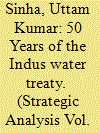

|
|
|
| 2 |
ID:
087602
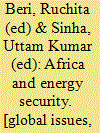

|
|
|
|
|
| Publication |
New Delhi, IDSA, 2009.
|
| Description |
260p.
|
| Standard Number |
9788171887545
|
|
|
|
|
|
|
|
|
|
|
|
Copies: C:2/I:0,R:0,Q:0
Circulation
| Accession# | Call# | Current Location | Status | Policy | Location |
| 054177 | 333.7906/BER 054177 | Main | On Shelf | General | |
| 054178 | 333.7906/BER 054178 | Main | On Shelf | General | |
|
|
|
|
| 3 |
ID:
115903


|
|
|
|
|
| Publication |
2013.
|
| Summary/Abstract |
The Arctic ice is melting faster than predicted. In August 2012, calculations based on the satellite imagery indicated that the summer sea ice loss was 50 per cent higher than earlier estimates. 1 Scientific evidence now suggests that the Arctic, by the middle of the century, will be ice free in the summer. Scientists call it the 'Arctic amplification'-the reduction in the ice cover not only reduces the reflection of the sunlight but also increases the absorption of heat as the darker water is exposed.
|
|
|
|
|
|
|
|
|
|
|
|
|
|
|
|
| 4 |
ID:
135045
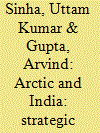

|
|
|
|
|
| Summary/Abstract |
A global temperature rise is being experienced earliest and most intensely in the Arctic region. The changes are worrying but the commercial interests are equally enticing. The Arctic is witnessing the convergence of the geophysical, the geo-economic and the geostrategic in strange and dramatic ways, making it a paradox and an antithesis. For India, the Arctic is distant when it comes to economic interests and near when it comes to climate change. As India today reassesses and rethinks its role in the new global geopolitical space, the Arctic becomes an important part of that reorientation and a movement towards a ‘global knowledge commons’. The Arctic is now an important geographical categorisation in India’s global policies. It must also be stressed that recent Arctic ascendancy in the policy domain stems directly from the strengthening of India’s climate change-linked economic and scientific positions in global world affairs.
|
|
|
|
|
|
|
|
|
|
|
|
|
|
|
|
| 5 |
ID:
191599
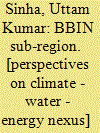

|
|
|
|
|
| Publication |
New Delhi, Pentagon Press LLP, 2024.
|
| Description |
xiii, 176p.hbk
|
| Standard Number |
9788195189458
|
|
|
|
|
|
|
|
|
|
|
|
Copies: C:2/I:0,R:0,Q:0
Circulation
| Accession# | Call# | Current Location | Status | Policy | Location |
| 060428 | 553.7/SIN 060428 | Main | On Shelf | General | |
| 060429 | 553.7/SIN 060429 | Main | On Shelf | General | |
|
|
|
|
| 6 |
ID:
111295


|
|
|
| 7 |
ID:
099649


|
|
|
|
|
| Publication |
2010.
|
| Summary/Abstract |
With the first commitment period of the Kyoto Protocol expiring in 2012, time seems to be running out for a new successor agreement. The Protocol remains the most comprehensive attempt to negotiate binding limits on anthropogenic greenhouse gas (GHG) emissions. The long-term challenge, defined by the United Nations Framework Convention on Climate Change (UNFCCC), is to stabilise GHG concentration in the atmosphere at levels that would prevent interference with the climate system. There are, however, economic and social realities that drive anthropogenic GHG emissions. States face serious challenges of balancing economic growth on the one hand, and sustainability of natural resources and energy choices on the other. This dilemma has for long defined and continues to underline the climate change debate. This article chronicles the process of climate change negotiations and examines the political deadlocks through scientific uncertainties, lack of trust-building, inadequate leadership and political regrouping.
|
|
|
|
|
|
|
|
|
|
|
|
|
|
|
|
| 8 |
ID:
086225


|
|
|
|
|
| Publication |
2009.
|
| Summary/Abstract |
The realities of climate change are unsettling and define to a great extent the challenges of the twenty-first century. The pressures of living in an age of risk are high with diverse constituencies now involved in the development of climate policy. Policy responses to the prospect of climate change, in particular capping carbon emission, will dominate negotiations and determine the structure of a new regime that is universally ratified and comes into force by 2012.
|
|
|
|
|
|
|
|
|
|
|
|
|
|
|
|
| 9 |
ID:
095955
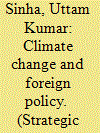

|
|
|
|
|
| Publication |
2010.
|
| Summary/Abstract |
Climate change has acquired high priority in the United Kingdom's foreign policy. It has in recent years raised the issue of climate change at various international forums, such as G-8, the European Union and the UN Security Council. This article examines how and why climate change has become one of the core components of UK foreign policy, and in so doing analyses the interconnections between foreign policy and climate change, and interactions between domestic and international politics.
|
|
|
|
|
|
|
|
|
|
|
|
|
|
|
|
| 10 |
ID:
171749
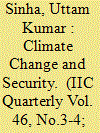

|
|
|
| 11 |
ID:
089901
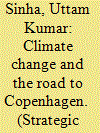

|
|
|
|
|
| Publication |
2009.
|
| Summary/Abstract |
The Road to Copenhagen in December 2009 has two visible signposts. One that reads, 'The time for climate change action is now', the other that warns, 'The road is bumpy'. The first signpost expresses the apocalyptic language that the earth's rising temperatures are poised to set off irreversible consequences if concrete steps are not taken quickly. It suggests that the climate is nearing tipping point. The second signpost forewarns that arriving at a bold, equitable, and binding treaty will not be easy and that the politics of climate change will undermine the science of climate change. Irrespective of whether the climate change probability is high, medium, or low, arriving at a consensus in Copenhagen from December 7-18, referred to as the 'Son of Kyoto', will clearly test the tenor of the international community in involving a framework beyond 2012. Any expected 'grand deal' will structure around four contested issues.
|
|
|
|
|
|
|
|
|
|
|
|
|
|
|
|
| 12 |
ID:
123135
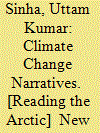

|
|
|
|
|
| Publication |
New Delhi, IDSA, 2013.
|
| Description |
83p.Pbk
|
| Series |
IDSA Monograph Series No.25
|
| Standard Number |
9789382169253
|
|
|
|
|
|
|
|
|
|
|
|
Copies: C:2/I:0,R:0,Q:0
Circulation
| Accession# | Call# | Current Location | Status | Policy | Location |
| 057407 | 363.7/SIN 057407 | Main | On Shelf | General | |
| 057408 | 363.7/SIN 057408 | Main | On Shelf | General | |
|
|
|
|
| 13 |
ID:
091387
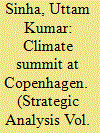

|
|
|
|
|
| Publication |
2009.
|
| Summary/Abstract |
Climate change is hugely challenging. But there is an unmistakable straighforwardness to it reduce emissions to reduce global warming. In many ways, this reflects the sum total of the paradoxes that define our reality and the contradictions and hypocricy of coping and dealing with it.
|
|
|
|
|
|
|
|
|
|
|
|
|
|
|
|
| 14 |
ID:
059518


|
|
|
| 15 |
ID:
074152


|
|
|
| 16 |
ID:
066758
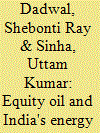

|
|
|
| 17 |
ID:
109806


|
|
|
|
|
| Publication |
2012.
|
| Summary/Abstract |
China is a thirsty country desperately in need of water-a lot of it. In order to meet its water and energy requirements in the densely populated and fertile northern plains, it is successively making interventions in the Tibetan rivers in the southern part through dams and diversions. While China is well within its riparian rights to do so, a set of externalities involving the principles of water-sharing and lower riparian needs-stretching from Afghanistan to Vietnam-raise concerns. Politically controlling Tibet and thereby having control over the mighty rivers that originate there allows Beijing to overcome its uneven water distribution but also importantly gives its leaders strategic width and diplomatic clout for dealing with its neighbours. Based on the theoretical framework of power and hydro-hegemony this article examines how China's hydro-behaviour on the Brahmaputra (Yarlung Ysangpo) could impact power relations with India and what India's counter-hydro-hegemony strategy should be.
|
|
|
|
|
|
|
|
|
|
|
|
|
|
|
|
| 18 |
ID:
089278


|
|
|
| 19 |
ID:
147956
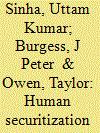

|
|
|
|
|
| Summary/Abstract |
In the large and growing literature on hydropolitics, insecurity generated through water-related conflicts is most often conceptualized under a model of economic resource scarcity. Conflict is generally reduced to the question of who has water, who needs water and thus what cost, in economic, political or military terms, is appropriate to acquiring access to water. This article argues that while such analyses effectively chart the central resource-strategic relations involved in the geopolitics of water, they nonetheless disregard the deeper biological and cultural (that is social, ethnic, religious) significance of water in any water conflict. Such analyses, it claims, are too strongly linked to the traditional (as opposed to human) security discourse and therefore run the risk of misdiagnosing the complexity of the water resource challenge. To respond to this challenge the article will develop a human security ‘metrics’ for analysing water-based conflicts in human security terms. It will then compare an analysis of the Indus Waters Treaty based upon the human security approach with an analysis based on a ‘traditional’ security assessment of the treaty in order to assess the viability of the two approaches. Finally, the article will link the comparative assessments back to the water wars literature, drawing conclusions about its strengths and weaknesses and the possibility of a synthesis of traditional and human security in the analysis of water conflict.
|
|
|
|
|
|
|
|
|
|
|
|
|
|
|
|
| 20 |
ID:
083927


|
|
|